HOW MILLENNIALS ARE SHAPING THE FASHION WORLD

 Millennials are changing the world, and the world is changing for millennials. Whether they like it or not, every industry has had to adapt to the unique qualities and tastes of this new generation. Of course, the fashion industry is not an exception, and may even reflect a unique manifestation of the rapid changes brought about by this rising demographic of consumers. Here, we will look at how millennials are influencing and shaping the way the fashion world works.
Millennials are changing the world, and the world is changing for millennials. Whether they like it or not, every industry has had to adapt to the unique qualities and tastes of this new generation. Of course, the fashion industry is not an exception, and may even reflect a unique manifestation of the rapid changes brought about by this rising demographic of consumers. Here, we will look at how millennials are influencing and shaping the way the fashion world works.
No logos, no problem
In recent years, luxury brands have had to re-examine their approach to the growing millennial market, who have no desire for flashy designer logos. Although they are a generation built on selfies and Facebook stories, appearances don’t seem to matter when it comes to what used to be the ultimate status symbols.
Indeed, millennials have been giving classic luxury brands a run for their money. Gucci’s sales dropped by 1.1% in 2014, while Prada’s showed a decrease of 1.5% — a slump that luxury designers in the industry fear will only get worse. Brands like Abercrombie and Fitch and Michael Kors have removed their previously ubiquitous brand logos on some pieces completely to adapt to the millennial’s fashion preference, embracing the movement towards logo-less but high-quality fashion items.

Green is the new black
The ramifications of fast fashion on the environment and on factory workers are starting to catch up to the industry, as more and more millennials are choosing brands that have an ethical approach to production. Entrepreneur reports that millennials have become hyperaware of brands’ corporate social responsibility efforts, and will abandon companies that do not participate in programs that contribute to society. Indeed, cruelty-free is no longer just a buzzword in the fashion world, but something industries are shifting to in order to stay ahead of the curve.
According to a poll by Nielsen, 73% of millennials are willing to pay more for brands that focus on sustainability — that’s three out of four of the survey’s 30,000 respondents. For this generation, clothes have to suit personal advocacies as well, putting the pressure on companies to go green or go bankrupt.
Into the digital cart
High-tech fashion has escaped from sci-fi fantasies and into everyday life, with tech-savvy millennials blurring the line between technology and the fashion industry today. It’s not just smart watches or 3D printed shoes either — technology has revolutionised the way the fashion industry produces, advertises, and sells.
A study by BigCommerce shows that two out of three millennials prefer shopping online than shopping in a physical store. This preference is reflected in the several applications dedicated to promoting the latest fashion pieces and trends. Meanwhile, Pretty Me enumerates some of these key apps that have revolutionised how millennials think about their wardrobes and buy clothing online. Fashion retailers are also relying on big data analytics to monitor sales and predict consumer needs, producing stylish clothing even before the hashtags start trending.
Not like other girls
If the '80s were dominated by Madonna-esque vibrant colours, and the '90s defined by plaid tops and distressed jeans, the current trend for the typical fashionable millennial is individuality.
There seems to be a lack of overarching definition for the millennial’s style, as they often tend to mix styles according to their personality. They could pull off a sleek bomber jacket paired with four-inch stilettos and a feminine floral top — all because millennials aren’t shy about showing off their individuality through the uniqueness of their looks. Brands like Burberry and Fendi have responded to this by releasing exclusive and limited-edition items, even going so far as to allow customisation of colours.
The fashion world is finding that new trends are popping up every second, exponential changes made possible by social media and technology. As big names in fashion race to adapt to the millennial’s need for individuality and sustainability, one can only wonder what new styles and parameters this generation will set in the coming months, days, or on the next trending Instagram post.
How global acrylic fiber leaders engineered price stability amid historic A…

The global Acrylic Staple Fibre (ASF) market, long known for its sensitivity to violent swings in petrochemical feedstocks is facing one of the most profound structural resets in its history. In 2025, while the price of Acrylonitrile (ACN), its primary feedstock, endured one of the steepest collapses in r... Read more
GTE 2025: An impactful event driving industry excellence
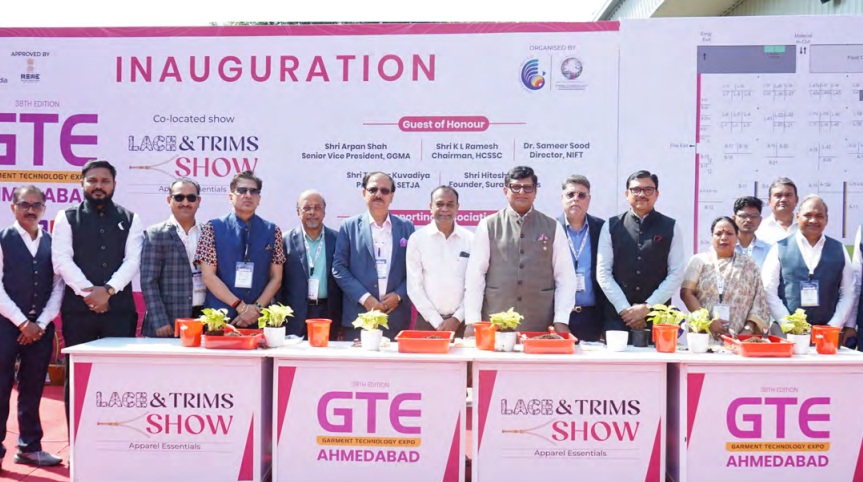
Jointly organized by Garment Technology Expo and India Exposition Mart(IEML), the 38th edition of the Garment Technology Expo (GTE) proved to be a powerful and impactful event. The event was held against a backdrop of global challenges, serving as a crucial catalyst and injecting exceptional dynamism int... Read more
Threads of Labor and Steel: The human-machine ecosystem powering India’s te…

India generates nearly eight million tonnes of textile waste every year, placing the country at the center of the global circular economy though it is rarely acknowledged as such. While much global attention centers on futuristic recycled fibers and chemical breakthroughs, a decades-old, quietly efficient... Read more
Hanging by a Thread: US Tariffs cripple Indian textile exports, orders drop…

India’s textile and apparel industry is facing an unexpected mid-cycle rupture that is reshaping the sector’s economics far faster than policymakers anticipated. What began as a favourable season for the spinning and raw-material economy, egged on by a weak rupee and heavy government-led cotto... Read more
Sourcing's new compass, navigating apparel's great migration beyond Asia

The global apparel sourcing business is redefining the metrics of success beyond traditional labor costs. Led by geopolitical risks, consumer demands for sustainability, and the need for greater agility, brands are adopting multi-regional strategies and looking to a new generation of sourcing partne... Read more
No A-Grades for Climate: What the fossil-free fashion scorecard reveals abo…

For years, the global fashion industry has promised a cleaner, greener future but 2025’s Fossil-Free Fashion Scorecard by STAND.earth offers a sobering verdict: not a single major brand has earned an ‘A’ for decarbonization. Despite public pledges, glossy sustainability reports, an... Read more
Wired Threads: How India’s textile backbone is powering the smart apparel f…

India’s huge textile industry, long celebrated for its command over cotton and competitive manufacturing scale, is going through a foundational redesign. At the heart of this shift lies an emerging consumer appetite for textiles that do more than drape and insulate. Fabrics are being engineere... Read more
The New Core Competency: How sustainability and advanced fabrics are drivin…

The SportTech Pavilion at Techtextil India, hosted by Concepts N Strategies, concluded with a unanimous declaration: for India to successfully execute its "Premium Mandate" and move "Beyond CMT," technical textile innovation and radical sustainability are non-negotiable. The future of Indian activewear reli... Read more
New EU import rules set to raise prices for Shein and Temu, boosting Europe…

Europe’s fashion and textile scenario is on the verge of its most consequential structural shift in over a decade. The European Union’s plan to abolish the €150 de minimis customs exemption for non-EU e-commerce imports, now fast-tracked for implementation by early 2026 is ready to ... Read more
Global apparel trade rebalances in 2025 as Europe rises, Asia stumbles: Waz…

As the global apparel economy enters the final quarter of 2025, trade flows across major markets reveal a sector facing contradictory currents, some markets still soft from inflation-linked demand fatigue, while others rise on renewed consumer confidence and resilient supply chains. Wazir Advisors’ ... Read more
Tariffs, turbulence and tenacity, India’s textile sector finds new strength

India’s textile and apparel export sector is showing a remarkable capacity to adapt and thrive in one of the most turbulent global trade environments in recent years. From punitive US tariff shocks to unpredictable demand cycles across international markets, the sector’s first-half performance... Read more
Future Fiber Demand and the Chemical Recycling Imperative: Global industry …
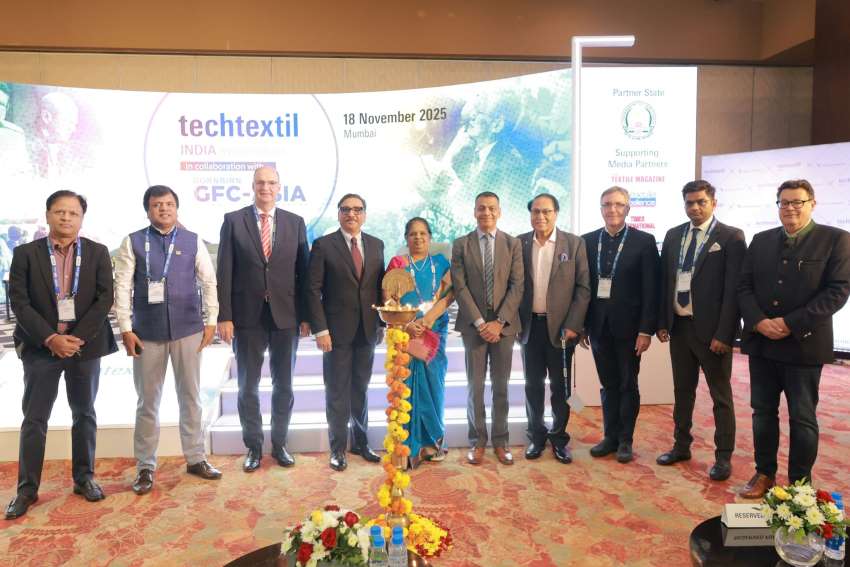
The global textile industry is entering a period of exponential growth and profound technological transformation, according to key figures speaking at the Dornbirn Global Fibre Congress (GFC) in Mumbai. While demand for fiber is set to soar, the industry's fossil-fuel foundation is shifting, placing pressur... Read more
Beyond CMT: Collaboration, not competition, is India’s new growth strategy
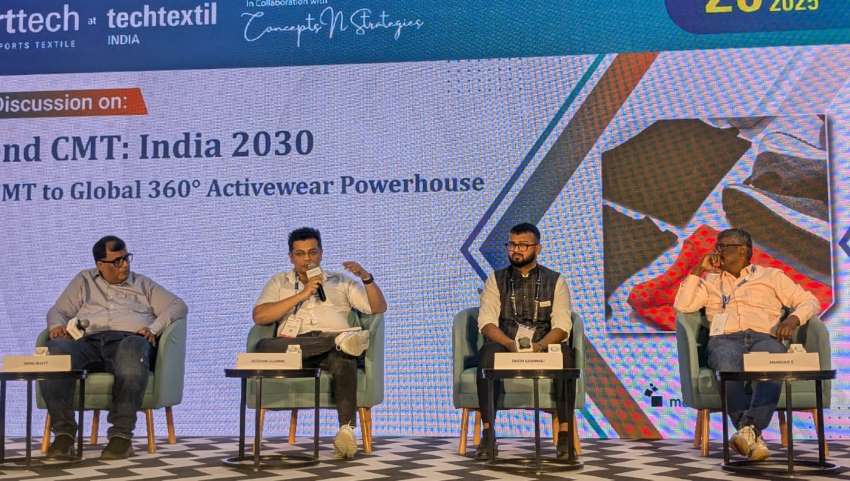
The journey for India’s activewear industry to move "Beyond CMT" (Cut, Make, Trim) and capture the global premium mandate is not constrained by market demand or labor, but by structural bottlenecks in the supply chain, investment philosophy, and training. Panel discussions at the Techtextil India SportTech Pavi... Read more
Inside Lululemon’s toughest year, tariffs, trend misses, and the fight to r…

For over a decade, Lululemon Athletica embodied everything the premium athleisure revolution stood for technical mastery, community-driven branding, and an almost cult-like customer following. Its rise was clean and uninterrupted, a masterclass in premium positioning. But 2025 has delivered an uncomfortab... Read more
India's ‘Technical Textile’ sector 'Important for the World,' says Techtext…
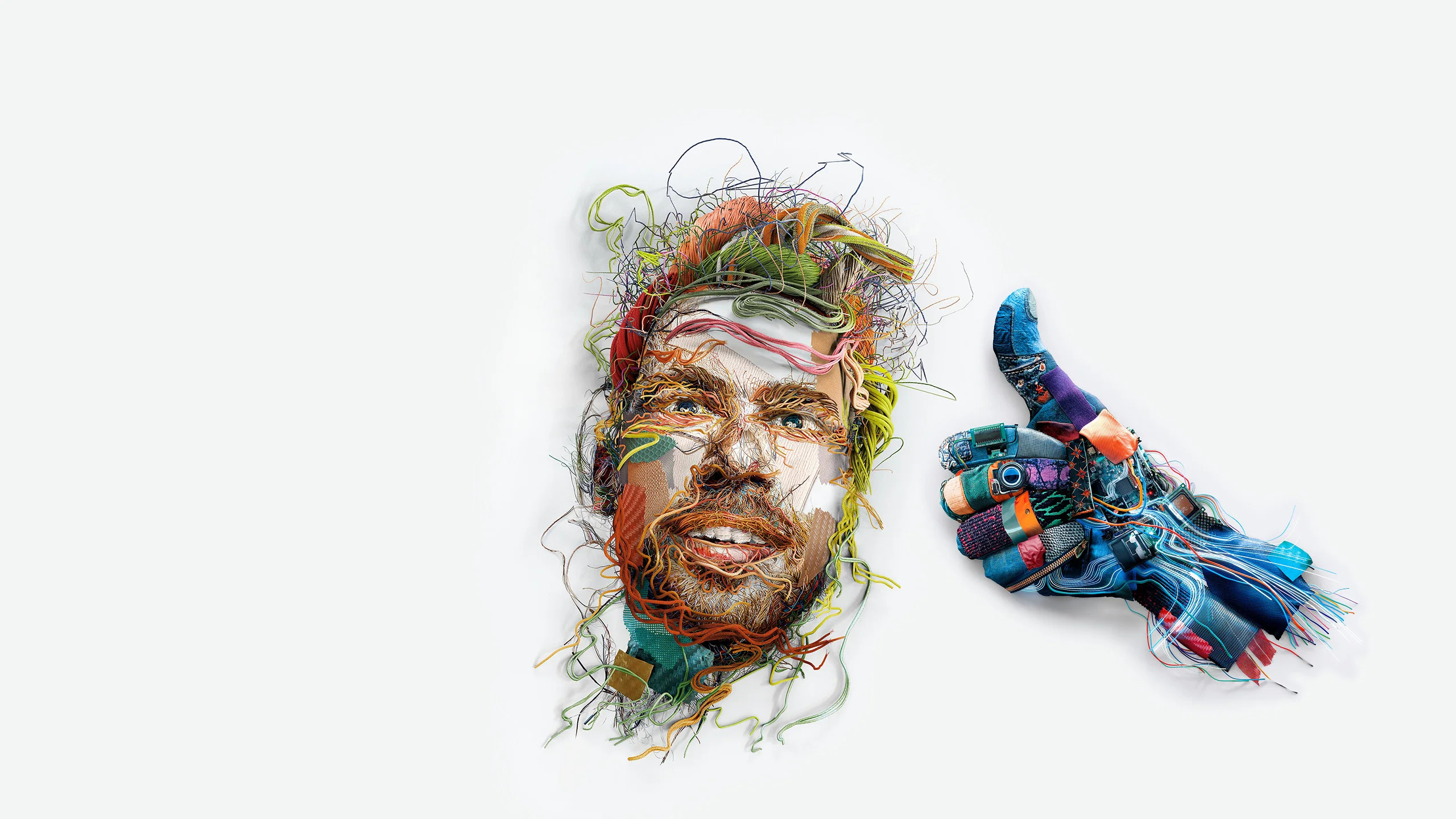
India is emerging as a global powerhouse in technical textiles, a growth recognized by the organizers of the world's leading technical textiles and textile processing trade fairs. Ahead of the Techtextil and Texprocess 2026 event in Frankfurt, Messe Frankfurt's Director Brand Management, Sabine Scharrer, ... Read more
Anti-Dumping probe on Chinese PTY threatens to negate QCO rollback benefits
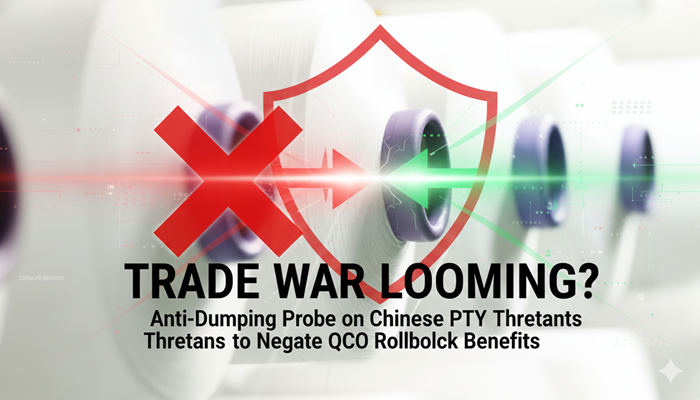
Just days after the Indian government withdrew Quality Control Orders (QCOs) on Polyester Textured Yarn (PTY) and other textile inputs to boost the cost-competitiveness of the downstream industry, the Directorate General of Trade Remedies (DGTR) has initiated a fresh anti-dumping investigation into PTY im... Read more
India's new ‘Labour Codes’ weave global compliance into apparel exports

The full implementation of India's four consolidated Labour Codes (The Code on Wages, The Industrial Relations Code, The Code on Social Security, and The Occupational Safety, Health and Working Conditions Code) marks a strategic overhaul of the country’s industrial framework, particularly bene... Read more
Cotton’s fragile comeback, how the US-China truce is redrawing global fiber…

When Presidents Donald Trump and Xi Jinping announced a fragile peace in Busan last week, most of the attention in financial circles revolved around soybeans, chips, and rare earths. But beneath the surface, the most immediate tremor was felt in the world’s oldest commodity trade, cotton. The... Read more

Future Fiber Demand and the Chemical Recycling Imperative: Global industry eyes India for next tech leap

The global textile industry is entering a period of exponential growth and profound technological transformation, according to key figures speaking at the Dor... Read more
Regenerative innovation and the Human-Centric future of textiles
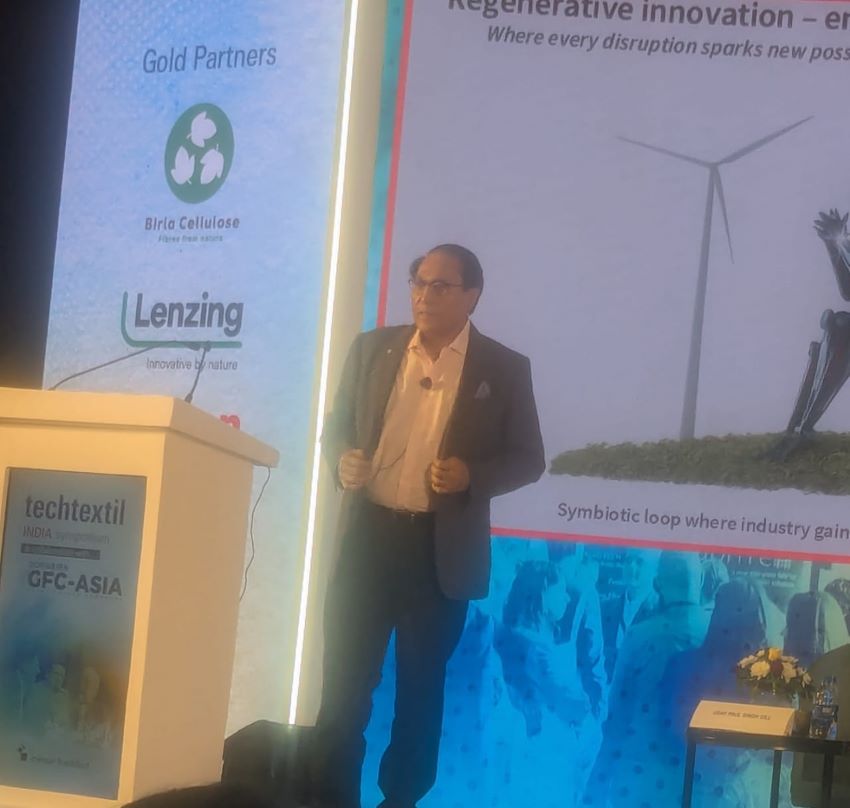
The global textile industry is at a crossroads where mere efficiency and profit no longer guarantee survival. This was the central message delivered by Uday P... Read more
Beyond CMT: Collaboration, not competition, is India’s new growth strategy

The journey for India’s activewear industry to move "Beyond CMT" (Cut, Make, Trim) and capture the global premium mandate is not constrained by market demand or l... Read more
Sustaining the 1.5°C Goal: The corporate imperative of COP28
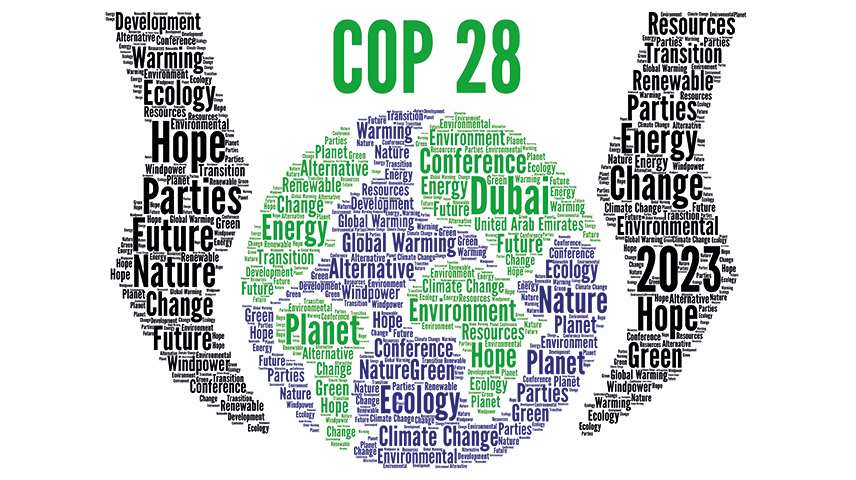
“COP28, coined as 'the financial focus COP,' will centre its discussions on vital financial and investment matters, highlighting the pivotal involvement... Read more
The crucial role of mega textile hubs in establishing India’s global leadership

Dr S N Modani, Managing Director, CEO, Sangam India is also the Chairman of the Rajasthan Textile Mills Association. With 33 years of experience in the textil... Read more
Eurecat x Canmartex to develop predictive quality control systems for knitwear t…
Aracne's system uses photonics, the Internet of Things, and artificial intelligence to predict potential manufacturing defects before the fabric is made. This ... Read more
Growing demand from domestic, foreign players boosts India’s textile machinery b…

Heralding a textile revolution in India, the textile machinery industry is transforming from labor-intensive to a more modern and automated manufacturing ... Read more
Innovation key highlight at ITMA 2023
ITMA has announced it will continue to present and share innovative manufacturing technology and materials with the industry at its 19th edition in Milan.... Read more
Bestseller opens new anticipated flagship store in Copenhagen
Bestseller has inaugurated its highly anticipated new flagship store in Copenha... Read more
Lenzing Group emphasizes on supply chain transparency to combat counterfeit…
A leading global producer of wood-based specialty fibers known for its sustaina... Read more
Primark opens 8th store in Poland
Reinforcing its commitment to physical retail dominance in Central and Eastern ... Read more
Munich Airport boosts revenue with new luxury fashion cluster in Terminal 2
Munich Airport (MUC) has upgraded its retail offerings in Terminal 2 by develop... Read more
Vardhman Textiles’ Rs 350 cr MMF leap rewires India’s apparel supply chain
For decades, cotton has defined India’s manufacturing identity and po... Read more
Perplexity AI launches new Rapid-Fire Virtual Try-On feature for Pro and Ma…
Perplexity AI launches new Rapid-Fire Virtual Try-On feature for Pro and Max subscribers ... Read more
Valentino faces severe backlash for new ‘DeVain’ handbag
Italian luxury powerhouse Valentino is facing a severe reputational crisis afte... Read more
Egypt to boost textile capacity with new development projects: Mostafa Madb…
Prime Minister Mostafa Madbouly announced, some of the top priorities of the Eg... Read more
Mauritius apparel sector shifts focus to Africa and Europe
A long-established leader high-quality textile and garment manufacturer, Maurit... Read more
India’s textile, apparel and handicrafts exports grow to $18.24 billion dur…
Once again demonstrating its resilience, India’s textile and apparel sect... Read more
Celio revitalizes brand with a new store concept
A major player in French menswear, Celio is revitalizing its brand, moving beyo... Read more
Denim Premiere Vision Milan showcases new elastic fiber-Xlance
One of the major attractions at this year’s Denim Premiere Vision Milan, ... Read more
Two retailers launch stores at Liverpool One this holiday season
Two exciting retailers are making a splash in Liverpool One this holiday season... Read more
Victoria’s Secret opens new store in Pavilion KL, Kuala Lumpur
Indicating a strategic move towards international expansion and providing an up... Read more
Gymshark opens first US flagship at Bond Street, NYC
Gymshark opened its first US flagship store on December 13 at 11 Bond Street, N... Read more
Scoop returns to Olympia National with showcase of leading Danish designers
Scoop will return to Olympia National from February 8–10, 2026, promising... Read more
Cotton prices in Brazil decline to a 16-year low as supply surpasses demand
Brazilian cotton prices have declined to a 16-year low due to a combination of ... Read more
Jack & Jones opens first two standalone stores in UAE
Marking a strategic commitment by its parent company, Jack and Jones recently o... Read more


